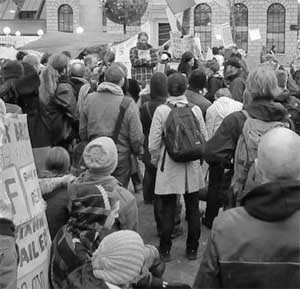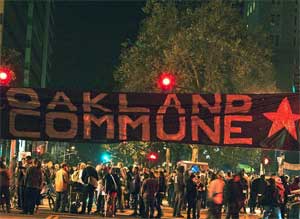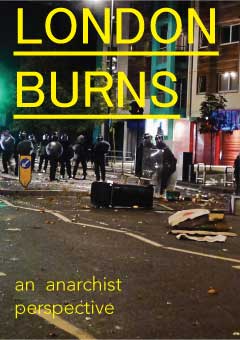Over 30 years of anarchist writing from Ireland listed under hundreds of topics
International
Occupy Movement, the Zapatista's and the General Assemblies
 The General Assemblies of the Occupy movement are creating a global experience in Direct Democracy. But this model did not come from nowhere - among other sources of influence is the Zapatista rebellion of southern Mexico, soon to enter its 18th year. Over almost two decades hundreds of rebel communities in Chiapas have used a General Assembly model to decide on how all aspects of life in the liberated zone will be organised. Despite their different circumstances to those faced by the majoity of the Occupy camps (in urban built up locations) there is still much that can be learnt from that experience.
The General Assemblies of the Occupy movement are creating a global experience in Direct Democracy. But this model did not come from nowhere - among other sources of influence is the Zapatista rebellion of southern Mexico, soon to enter its 18th year. Over almost two decades hundreds of rebel communities in Chiapas have used a General Assembly model to decide on how all aspects of life in the liberated zone will be organised. Despite their different circumstances to those faced by the majoity of the Occupy camps (in urban built up locations) there is still much that can be learnt from that experience.
This piece written for the Irish Mexico Group by a WSM member a few years after the start of that rebellion looks at how the Zapatistas organise themselves in great detail, what some of the problems they had faced are and how they overcame them. It also looks further into the history of General Assemblies and Direct Democracy in Mexico and around the globe. [Note: This long text is also available as a PDF file in a number of different formats suitable for distribution]
Occupy - the assembly process is the revolution
 As we prepare to enter the 3rd month of the Occupy movement a commonly heard criticism targets both the lack of clear demands and the related complex and often drawn out decision making processes being used at Occupy General Assemblies. These criticisms however miss the point, against the traditional left with its package of pre-set answers (best before 1917) what makes Occupy different is that process of decision making through assembly. The assembly form is not just a way of making decisions but also a different form of doing politics. The Assembly is in embryo the different world we seek to create.
As we prepare to enter the 3rd month of the Occupy movement a commonly heard criticism targets both the lack of clear demands and the related complex and often drawn out decision making processes being used at Occupy General Assemblies. These criticisms however miss the point, against the traditional left with its package of pre-set answers (best before 1917) what makes Occupy different is that process of decision making through assembly. The assembly form is not just a way of making decisions but also a different form of doing politics. The Assembly is in embryo the different world we seek to create.
Eyewitness Oakland General Strike - analysis of post N2 controversy in Occupy Oakland
 This eyewitness account of the build to and events of the 'Occupy' Oakland General Strike of Nov 2 describes how momentum developed in the aftermath of the violent eviction of Occupy Oakland, the events of November 2nd itself including the shut down of the port, the attempted occupation of the Traveler's Aid Society building and the black bloc's attack on bank buildings. The author looks at the controversy around these last two actions in the aftermath of November 2nd and warns that "If the Oakland Commune does not continue to accelerate the process of communization, it will fall back into either pure symbolism, or assume the counterrevolutionary form of reformism (two processes already in progress)"
This eyewitness account of the build to and events of the 'Occupy' Oakland General Strike of Nov 2 describes how momentum developed in the aftermath of the violent eviction of Occupy Oakland, the events of November 2nd itself including the shut down of the port, the attempted occupation of the Traveler's Aid Society building and the black bloc's attack on bank buildings. The author looks at the controversy around these last two actions in the aftermath of November 2nd and warns that "If the Oakland Commune does not continue to accelerate the process of communization, it will fall back into either pure symbolism, or assume the counterrevolutionary form of reformism (two processes already in progress)"
Workers Solidarity 124
Issue 124 of Ireland's anarchist paper Workers Solidarity November / December 2011.

Debate on the Occupy Oakland General Strike
 Yesterday in Oakland, California the Occupy X Movement took a major step when Occupy Oakland called a general strike which shut down the port of Oakland (5th busiest in the US ). The call for the General Strike emerged from the Oakland General Assembly in the aftermath of the police shooting of Scott Olsen on 25th October. The strike could not (for legal reasons) have the formal support of the Oakland unions but we understand that in particular the radical ILWU which organizes the docks had given a 'nod and a wink' that if a large protest was at the port gates work would be halted for 'health & safety' reasons as had happened during the US invasion of Iraq in 2003.
Yesterday in Oakland, California the Occupy X Movement took a major step when Occupy Oakland called a general strike which shut down the port of Oakland (5th busiest in the US ). The call for the General Strike emerged from the Oakland General Assembly in the aftermath of the police shooting of Scott Olsen on 25th October. The strike could not (for legal reasons) have the formal support of the Oakland unions but we understand that in particular the radical ILWU which organizes the docks had given a 'nod and a wink' that if a large protest was at the port gates work would be halted for 'health & safety' reasons as had happened during the US invasion of Iraq in 2003.
London Burns - PDF pamphlet on the August 2011 UK Riots
 We are making the text of our popular analysis 'London burns - causes & consequences of the riots - an anarchist perspective' available online as a PDF file. A limited number were produced for the WSM stall at the London anarchist bookfair but rapidly sold out. By making the PDF available we are inviting you to print out and distribute copies where you are.
We are making the text of our popular analysis 'London burns - causes & consequences of the riots - an anarchist perspective' available online as a PDF file. A limited number were produced for the WSM stall at the London anarchist bookfair but rapidly sold out. By making the PDF available we are inviting you to print out and distribute copies where you are.
The pamphlet is 28 pages in length and can be printed on the popular A4 (Europe) or US Letter (North America paper sizes). The text has already been translated into French, if you are aware of additional translations use the contact form above to let us know about them.
Greece bargin outlet
Don’t visit Greece this summer, boycott it. This is not an order by the invisible hand of the markets, but a mere suggestion from someone who was born in the so-called Greek territory.
Anarchist Economics and the Occupy X Movement
There’s a lot of folks taking to the streets (and a Park) in the capitol of capital right now—Wall Street—and all over the world in response. The general sentiment seems to be that folks are fed up with a tiny elite controlling the lives of the rest of us—now on an unprecedented scale. This is made possible, in part, by a system of economics and government designed to enrich a few folks at the expense of the majority of us. That is, the social systems we’ve collectively built, and that we collectively maintain and reproduce, allow for this state of affairs.
The real cost of energy privatisation - a look at the UK
As temperatures drop and household energy bills soar again this autumn, the PR battle to privatise our energy infrastructure is just heating up. The IMF/EU claim that competition, the favourite euphemism for privatisation, will lower costs for consumers. The Government claims, as usual, that it has no choice but to do what its overlords instruct. So now seems like a good time to observe how that privatisation has been working out for our nearest neighbours in the UK.
Resistance pays off in Greece as bond holders burnt
 Months of intense resistance by ordinary people in Greece appear to have resulted in a partial victory. The EU crisis summit conceded that bond holders be forced to shoulder 50% of their losses. This did not come easy, Greek workers have staged several general strikes and Athens has seen day after day of large scale rioting.
Months of intense resistance by ordinary people in Greece appear to have resulted in a partial victory. The EU crisis summit conceded that bond holders be forced to shoulder 50% of their losses. This did not come easy, Greek workers have staged several general strikes and Athens has seen day after day of large scale rioting.
The contrast with Ireland is clear. Here the union leadership called off token resistance in the first months of the crisis and workers passively marched, shrugged their shoulders and went home. As a result the ordinary Irish worker alone, the majority of 'the 99%', have shouldered all the costs. Bond holders will scontinue to have their failed gambles covered. Next week alone another 700 million will be handed over to the Irish & global 1% to cover their losses in Anglo. This is our ‘thanks’ for being the poster boys for austerity across Europe.

